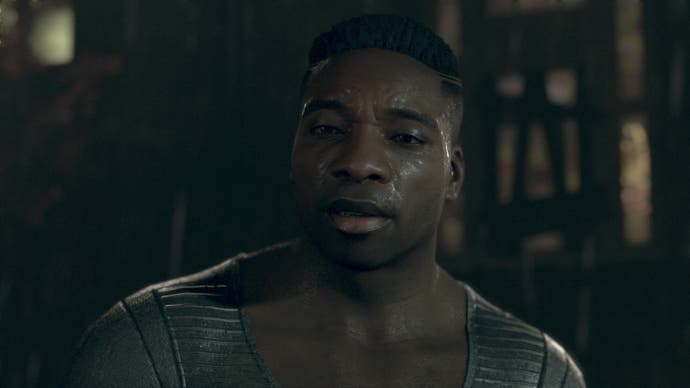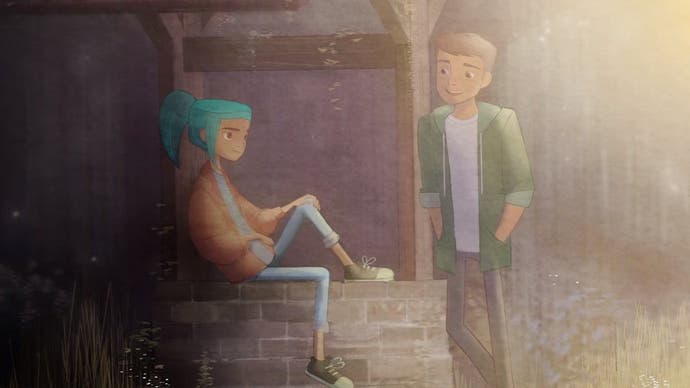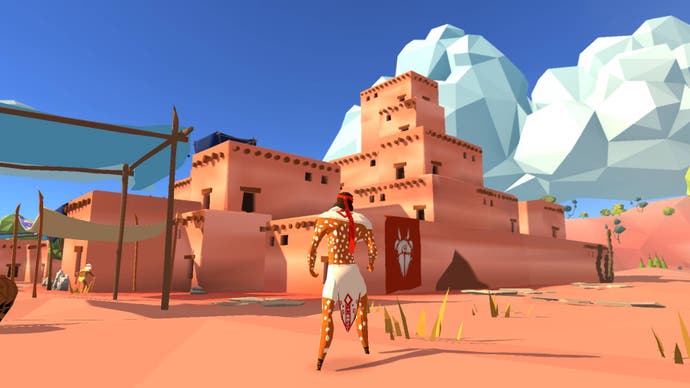The state of blackness in games
From Yakuza to Oxenfree.
Seeing a black person in a game is still a strange experience more often than not. For the longest time, black characters seemed to fall precisely into two categories, scary and...funky. Both of these stereotypes are still very much alive, and yet I can also finally see some breakthroughs - games in which black people don't fill a role, and instead get to be just people.
Your average scary black character is at first glance like so many other men in games. He's buff, and he has a gun. What you need to take into account however, is how this stereotype has affected black men in real life: many people still readily draw the conclusion that a black man who looks a certain way is likely to have a history that includes a council house upbringing and a brush or two with the law. The 'hood', the American version of this, is the birthplace of many tragic gaming characters. You have a whole host of guys just trying to do better for themselves and falling in with the wrong sort of people in GTA: San Andreas. Marcus Holloway, the protagonist in Watch Dogs 2, only discovered his love for computers through a community program for members of low-income households. With the number of black men in games overall, telling such stories using black characters is a conscious choice, a way to justify using an established stereotype.
The same is true for black soldiers in games. Of course there are soldiers of several ethnicities and genders in games, because if there's one power fantasy in games everyone will be able to fulfil, it's being a soldier. The portrayals of black characters in these situations often lack nuance, however. Take Barrett Wallace from Final Fantasy 7. In stark contrast to every other character in the game, he is the angry, brash Mr. T lookalike. While he later redeems himself, from the way he is set up, it's no wonder that Barrett is the one whose anger is severe enough to lead to extremism.

Elsewhere, the menacing black man is a bodyguard (Yakuza) or an android model designed to carry heavy loads (Detroit: Become Human). In Detroit, this is once again a conscious decision in an otherwise diverse game world, jarring especially when an android's body type in no way has to determine its physical strength. Furthermore, it alludes to another frequent stereotype for black people, that of the hulking individual best suited to manual labour.
The funky black guy can be credited almost entirely to Japanese gaming companies, even though EA deserves special mention for the two black characters in SSX Tricky. I'm also side-eyeing whoever gave Crackdown a second, then a third lease of life, too. The funky black guy either sports an afro, says "yo" a lot, wears sunglasses indoors, or all three. He's also usually loud, and claims to be a "free spirit" or anything else that makes people think of Chris Rock or Dennis Rodman. He's often a quest-giver, or someone who appears in the background for laughs, such as in Persona 4 or Ni no Kuni 2. There's often at least one character of this type in every fighting game, including Tekken and Dead or Alive.
Over the years, several game developers have thankfully stepped up to change the perception of black characters in games, and it's particularly female characters who appear in more well-rounded, empowering roles. Perhaps this isn't much of a surprise, given the stronger female presence in games overall.

BioWare's characters are far from perfect. From romance options that feel shoehorned in to stereotypically promiscuous gay people, there's still work to be done. However, both Dragon Age and Mass Effect excel at portraying normal characters whose ethnicity isn't used to make a point. Vivienne in Dragon Age: Inquisition is simply a smart woman, well-connected in the most esteemed social circles. The fact that she is black matters to me, because prior to Vivienne, for a black woman in a game to wield that much power was simply unheard of.
This is just a personal preference, but I enjoy the portrayal of normal black women much more than the sexy fighting game characters, or the hardened operative Sheva Alomar from Resident Evil. Those feel too purpose-built, too close to the angry black soldier, too much a reminder that in real life, a "strong black woman" often has to work five times as hard to overcome prejudice and be taken seriously.
It's an odd duality. I appreciate the hardened women from Horizon: Zero Dawn and Aveline de Grandpré from Assassin's Creed 3: Liberation, simply for the fact that someone thought to include them, but I can't sympathise with characters who get through life by being an angry black woman, knowing how hard-won acceptance is when everyone expects you to be angry.
Instead, I like black female characters that could be me. In an attempt to get players to identify with protagonists, you get the approachable guy who is elevated almost as if by accident in many games, from Infamous: Second Son to literally any main character in Far Cry post-Far Cry 2, so why not offer the same for women?

The closest I have seen black female characters come in this regard, no alcoholic parents, no mercenary past, are indie game characters. Nightschool Studios feature a black protagonist in both of their games, Oxenfree and the upcoming Afterparty. In both of them, the black characters are neither used as a cultural fit for the environment the story takes place in, nor does their ethnicity fulfil any role. They simply exist. The best example of a character who is pointedly normal is probably Clementine from Telltale's The Walking Dead series, which is fair seeing all she tries to do is survive.
As much as I enjoy character who can just "be", it's not a bad thing to use a minority as a cultural learning opportunity. Through the amount of investment I often only achieve through interactivity, I've learned about cultures I previously had no idea of.
Take Mexican developer Lienzo's Mulaka, for example. The game itself, which plays a bit like Zelda, is based on the culture of the indigenous Mexican Tarahumana tribe. Everything in its vibrant world, from your shaman protagonist to the monsters you encounter, seeks to accurately introduce a foreign culture to a wider audience.

Another game made with the same love for the developer's culture, is 2D platformer Dandara by Long Hat House. Even though it's slightly less obvious about its roots unless you know what to look for, the art of its protagonist was powerful enough to lead me to researching the real Dandara, who led several battles against the slavery of African people in Brazil.
I appreciate much smaller acknowledgments, too, simply because they may not be common knowledge: Firewatch developer Campo Santo dug deep into the complexities of rendering realistic African hair for its next game Valley of the Gods.
Generally, a greater diversity of characters and stories points to a greater diversity in the industry and of course the people who play games. Games aren't only growing as an industry, they're expanding in their portrayal of the world, and characters of different cultures are an important part of that.

